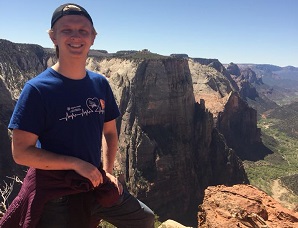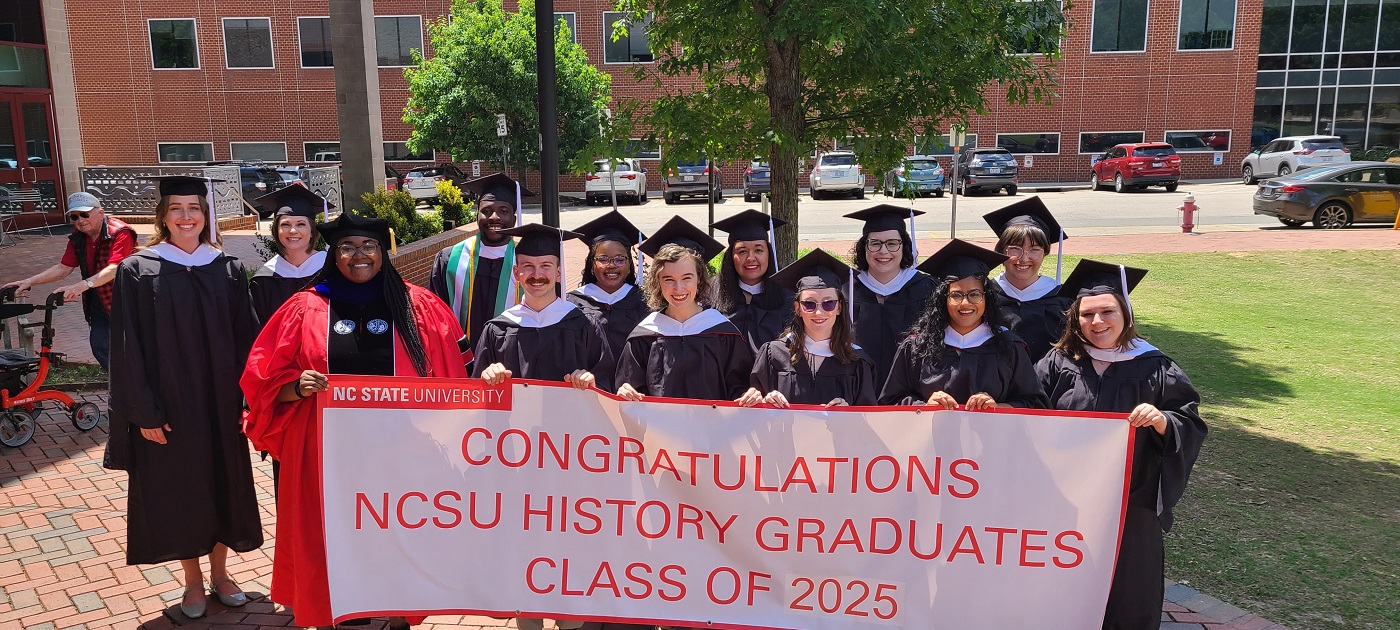Meet Our Outstanding Spring 2021 Public History and History MA Graduates
We would like to congratulate our History MA and Public History MA graduates 2021 graduates. We wish them the best of luck as they go out into the world.
History MA graduates
Blake Grasso was awarded distinction for his Master’s thesis, entitled “Sheep in the Wolf Den: The End of the Struggle for the Upper Ohio in the Seven Years’ War, 1758-1559.” Blake’s thesis revises our understandings of both French imperial power in the Ohio Valley, and adds to a growing body of literature which maintains that Native actors – not nascent European empires – remained the most powerful actors in the interior of North America. Grasso painstakingly shows that even in the midst of the Seven Years’ War, nations such as the Lenape (Delaware), Shawnee, and Haudenosaunee Mingo were the ultimate arbiters of French and English diplomatic and military success in the region. His thesis committee was deeply impressed with the depth of Blake’s research, which read English and French documents against the grain to bring Native voices to the forefront. Grasso’s strong and convincing argument ultimately forces us to rethink what we know about the Seven Years’ War in America.
Blake has taken a job with a logistics company while he continues the application process for jobs with the Department of the Interior and State Department.
 Laura Smith’s was awarded distinction for her thesis “Integrated Communities: Acculturation among Diaspora Communities in Two Roman Port Cities” compared commercial diasporas at two Roman ports, Delos in the Aegean and Puteoli in Italy, between the 2nd century B.C. and the 2nd century A.D. The thesis considered interactions among diverse diaspora communities within the same city as they experienced different levels of acculturation. Some communities took intentional steps to integrate into the host society and mitigate their differences while other communities appeared more reluctant to do so. The thesis attempts to explain these differences based on various cultural, social, and economic factors.
Laura Smith’s was awarded distinction for her thesis “Integrated Communities: Acculturation among Diaspora Communities in Two Roman Port Cities” compared commercial diasporas at two Roman ports, Delos in the Aegean and Puteoli in Italy, between the 2nd century B.C. and the 2nd century A.D. The thesis considered interactions among diverse diaspora communities within the same city as they experienced different levels of acculturation. Some communities took intentional steps to integrate into the host society and mitigate their differences while other communities appeared more reluctant to do so. The thesis attempts to explain these differences based on various cultural, social, and economic factors.
Laura is off to Indiana University to pursue a Ph.D. in ancient history.
James White was awarded distinction for his thesis, “Negotiating Authority: How Congress Shaped the Carter Administration’s Human Rights Policy toward Uruguay in 1977.” The thesis is a penetrating analysis of the precise ways the Carter administration applied pressure on one country to improve its egregious human rights record. White zeroed in on Uruguay, and his thesis shows how the administration worked through the US embassy in Montevideo, the US Congress and the Organization of American States to persuade the Uruguayan government to shape up.
James plans on being a High/Middle school teacher.
Clayton Kyle’s thesis explored Albert Camus’ relationship with Algeria. Born and raised in Algeria, Camus’ connection with Algeria remained strong throughout his life, and it deeply influenced his famous writings. Clayton was especially interested in the ideological battles that Camus was engaged in with French intellectuals during the Algerian war, battles that often created deep rifts with previous allies like Jean-Paul Sartre and Simone de Beauvoir.
Clayton will begin a graduate certificate teaching program within the Department of Education in the fall.
Austin Mitchell’s thesis, “Civic Development in Early National Raleigh: Local Institutions and Republican Order,” argues that economically and socially prominent white men and women who worked in local institutions and associations were successful in economically developing Raleigh and its surrounding area, and in laying the foundation for the city’s early civic culture. However, these efforts were contested by local poor whites, free and enslaved blacks, and so-called “unruly” women who did not fit the vision of respectability promoted by wealthy white men and women. In response, wealthy white men and women marginalized their “non-respectable” neighbors as threats to republican order.
Austin also served as co-chair of the History Graduate Student Association.
Lincoln Hirn’s thesis, titled “’Such Outrageous Crimes to Human Beings’: Portrayals of the Domestic Slave Trade in Nineteenth-Century Slave Narratives,” argues that narrators of nineteenth-century slave narratives used their knowledge of slavery’s economy to condemn the cruelty of White enslavers, showcase the morality of enslaved people, and depict the triumphant liberation of enslaved people. Although historians have acknowledged enslaved peoples’ agency in trying to negotiate the circumstances in which they lived, Hirn demonstrates that enslaved resistors were experts in the systems of their own oppression, and they used that knowledge to create resistant spaces wherever possible.
In the fall, Lincoln will be attending the doctoral program in history on a full scholarship at the University of Connecticut, studying with Minisha Sinha, one of the foremost scholars of nineteenth-century abolitionism.
 Christine Johnson is a former high school history teacher. Her MA thesis, “Celebrating a National Myth: The Civil Rights Movement in Textbooks, Juvenile Biographies, and Museums,” considers the ways citizens of all ages learn about the civil rights era. She concludes that, with a few exceptions, all continue to present narratives that have little explanatory power for understanding the movement’s complexity as well as contemporary struggles for racial justice. In so doing, Johnson makes a valuable contribution to our understanding of the role of education and the stakes of civil rights memory.
Christine Johnson is a former high school history teacher. Her MA thesis, “Celebrating a National Myth: The Civil Rights Movement in Textbooks, Juvenile Biographies, and Museums,” considers the ways citizens of all ages learn about the civil rights era. She concludes that, with a few exceptions, all continue to present narratives that have little explanatory power for understanding the movement’s complexity as well as contemporary struggles for racial justice. In so doing, Johnson makes a valuable contribution to our understanding of the role of education and the stakes of civil rights memory.
Christine plans to pursue a job in history education, whether through a historic site/museum, community college, or educational company.
Public History MA Graduates
Samantha Aamot focused her studies on decolonizing the archive. She interned at the Khayrallah Center for Lebanese Diaspora Studies where her work revolved around the digital exhibition Turath: An Exhibition of Early Arab American Culture. Aamot conducted primary and secondary source research on early Arab American culture, wrote and edited exhibit text, organized and conducted virtual interviews with family members and scholars, and crafted alt-text descriptions. Her committee, Drs. Kertesz, Khater, and Gordon, agree, that her portfolio defense was one of the best they had seen. Sam will be continuing her education at the Masters of Information and Library Science at UNC Chapel Hill.
Isabella Banner interned at The History Museum of Carteret County where she accessioned and organized the previously untouched Emily Loftin Collection which was donated in 1985. Banner wrote a 2,000 word article on the life of Emily Loftin and the collection as a whole which will be published in the upcoming edition of the Carteret County Historical Society’s journal.
Isabella is currently searching for a job at a museum or historic site in eastern North Carolina.
Corinne Foster’s work  focused on public history and the environment. She digitized over 6,000 photos relating to the forest products industry during her internship at the Forest History Society.
focused on public history and the environment. She digitized over 6,000 photos relating to the forest products industry during her internship at the Forest History Society.
Corinne will continue her education in the Master’s of Library/Information Science program at UNC Chapel Hill.
 Paige McCoy specialized in historic site interpretation. She interned at Manassas National Battlefield Park where she assisted with park operations, such as providing orientation and information to park visitors. She also conducted formal interpretive walking tours and talks related to the park’s interpretive themes. Additionally, she undertook historical research to support interpretive program development and writing.
Paige McCoy specialized in historic site interpretation. She interned at Manassas National Battlefield Park where she assisted with park operations, such as providing orientation and information to park visitors. She also conducted formal interpretive walking tours and talks related to the park’s interpretive themes. Additionally, she undertook historical research to support interpretive program development and writing.
Paige will spend this coming summer as a park ranger for the National Park Service at the National Mall.
 Alanna Natanson worked as an intern at the Smithsonian Institution, Archives of American Gardens, where she enhanced public access to images of American gardens and gardeners by describing a new collection, improving metadata for existing collections, and sharing garden images from collections through public platforms and instruction.
Alanna Natanson worked as an intern at the Smithsonian Institution, Archives of American Gardens, where she enhanced public access to images of American gardens and gardeners by describing a new collection, improving metadata for existing collections, and sharing garden images from collections through public platforms and instruction.
Alanna will continue her education at UNC Chapel Hill in the Masters of Information and Library Science program.
 Emma Stout interned at Historic Resources and Museum Program in Raleigh where she accessioned and digitized items in the Pope House Archival Collection.
Emma Stout interned at Historic Resources and Museum Program in Raleigh where she accessioned and digitized items in the Pope House Archival Collection.
Emma also served as co-chair of the History Graduate Student Association.
Emma will continue her education at UNC Chapel Hill in the Masters of Information and Library Science program.
 Amelia VerKerk interned at the Sallie Bingham Center at the Rubenstein Library of Duke University, where she assisted the research and technical services teams on reference and processing projects.
Amelia VerKerk interned at the Sallie Bingham Center at the Rubenstein Library of Duke University, where she assisted the research and technical services teams on reference and processing projects.
Amelia, who specialized in women’s history, curated the HI 591 exhibit “STEMinists: Women in STEM at NC State.”
She will continue her education at UNC Chapel Hill in the Masters of Information and Library Science program.
- Categories:





